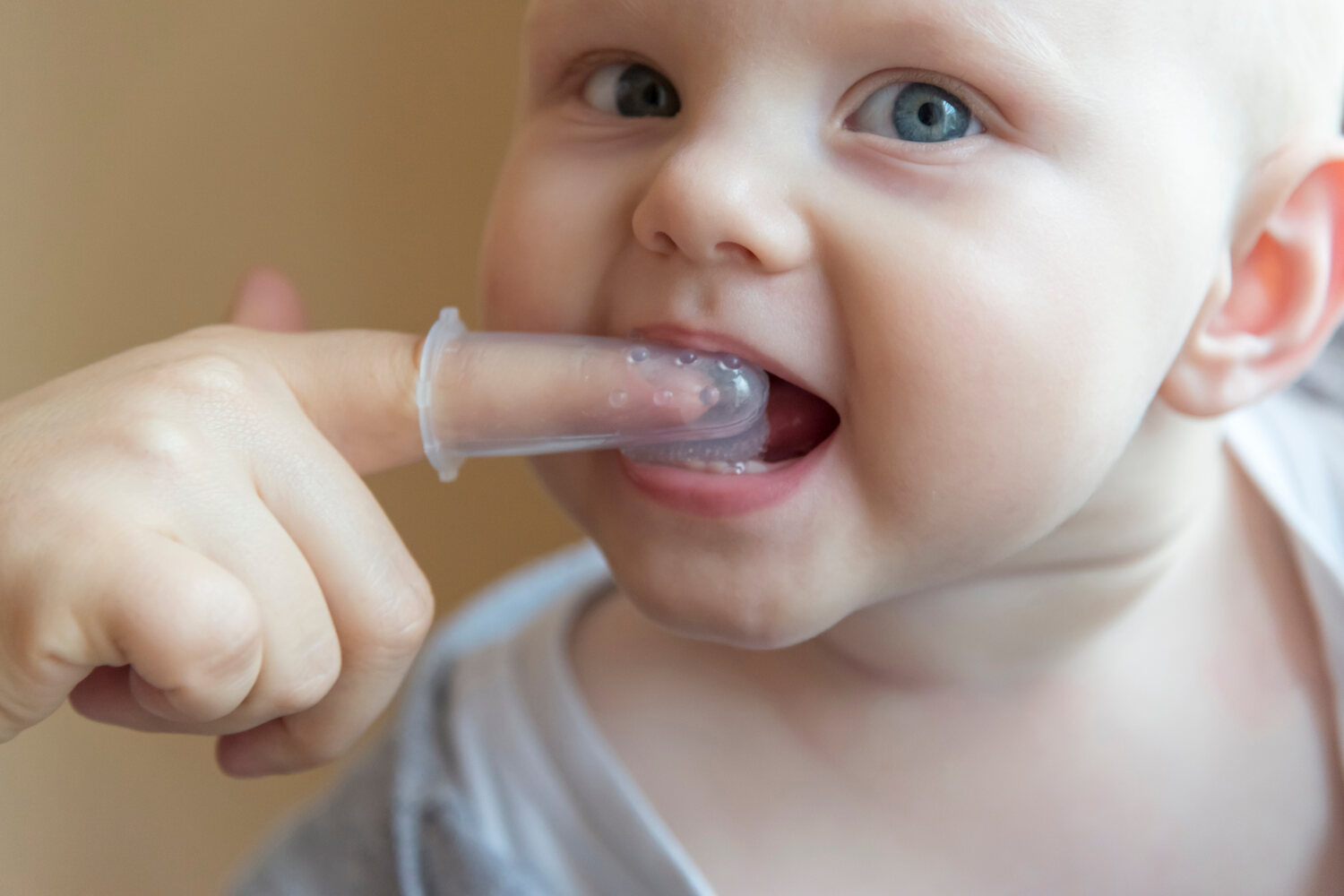
They are just baby teeth!! Baby’s teeth are bound to fall anyway, so why care about them?!!! This is the opinion most parents have when it comes to baby, milk or primary teeth. Milk teeth are a set of 20 teeth that your baby begins to get from 6 months to 2 years of age. These help your baby chew food and aid in proper speech due to good pronunciation. Primary teeth form the cornerstone for good and healthy permanent teeth in the future. They act as a strong foundation for the eruption of permanent teeth as your baby grows [1].
Thus, it is crucial to take care of your baby’s milk teeth right from the moment the first tooth pops out. This informative blog will explore everything about the process of teething, the importance of baby dental health, and how to care for baby teeth to educate parents to seek dental help when needed.
In This Article
- When Do Babies Start Teething?
- Why Is Baby Dental Health Important?
- When To Start Caring For Baby’s Teeth?
- How To Care For a Baby’s Teeth?
- Dental Problems In Babies
- Tips To Keep Your Baby’s Teeth Healthy
- When To Consult A Doctor?
- FAQs
When Do Babies Start Teething?
Seeing your baby’s first tooth is an exciting milestone in their life! Teething is a common physiological process in babies that occurs when baby teeth begin to erupt above the gumline. This usually occurs as early as 3 months of age for some babies, while others may experience it as late as 6 to 8 months. Teething causes a cascade of symptoms like gum soreness, tenderness, pain, discomfort, drooling, loss of appetite, crankiness, lack of sleep, mild fever due to gum inflammation, and sometimes diarrhea (due to infection since babies tend to put anything and everything in their mouth) [2].
However, it is important to note not all babies may experience teething symptoms. Some may sail through this phase without much pain and discomfort.
Why is Baby Dental Health Important?
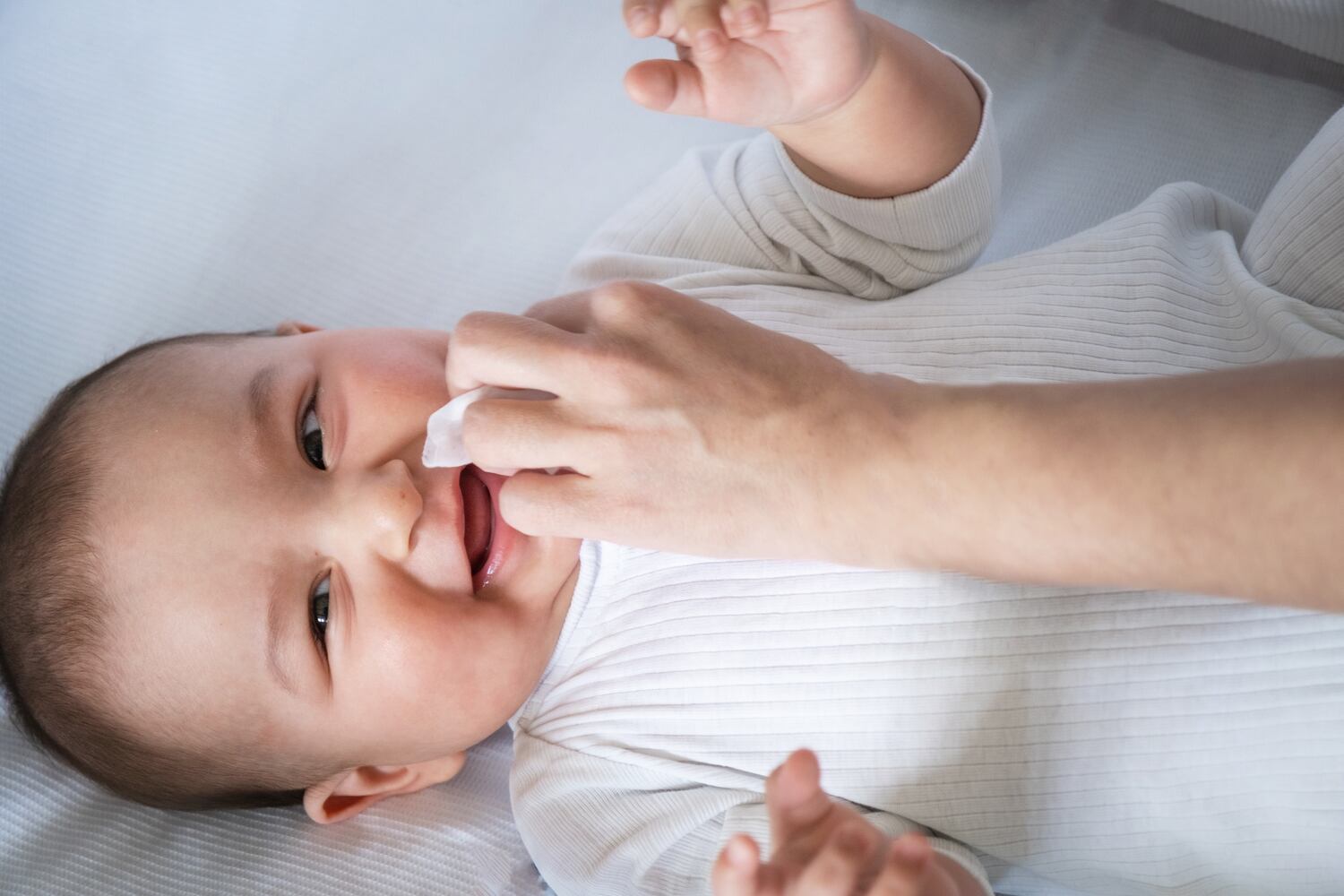
Baby dental health is essential and it should begin as early as possible or as soon as the first tooth erupts. Dental health is important in babies since it paves the way for healthy permanent teeth in the future. Baby dental care ensures your baby’s primary or milk teeth remain healthy and free of decay and other dental problems. Your baby’s primary teeth stay healthy and free from decay and other dental diseases. Whether you are nursing or bottle feeding, you must begin incorporating some type of dental regimen as soon as possible [3].
Furthermore, taking your baby to a dentist for regular dental checkups also contributes to improving dental health in babies, especially because of poor oral hygiene, bottle feeding, and unhealthy eating habits.
Dental care is important in babies because:
- Tooth decay in babies can be painful and frightening.
- Missing baby teeth leave gaps that can negatively impact their speech and chewing [4]
When to Start Caring For Baby’s Teeth?

Dental care for baby teeth should begin even before the first tooth erupts. Once your baby is about 3 months old, you can start taking care of the baby’s teeth. You can gently wipe your baby’s gums using damp, clean gauze or moist cotton twice a day, or after every feed. This prevents the pooling of milk and bacteria near the baby’s teeth and reduces their susceptibility to developing dental problems. This can also help your baby get ready for brushing when the first tooth appears.
How To Care For a Baby’s Teeth?
Proper dental care begins even before the first tooth erupts. When your baby has their first tooth appear, follow the below tips to care for your baby’s teeth:
- Place your baby’s head on your lap, hold it, and open their mouth gently.
- Use a small-headed, soft-bristled infant toothbrush that is gentle on your baby’s teeth and gums.
- Brush the baby’s teeth using a toothbrush and water, initially twice daily.
- Slowly incorporate the use of a low-fluoride toothpaste in a rice grain amount. Fluorides are essential minerals that help in the remineralization of the enamel to halt or prevent tooth decay [5].
- Once your baby is as old as 2 years, you must brush their teeth, and you can later supervise them to do so.
- Make sure they do not swallow the toothpaste and learn to spit in between while brushing their teeth.
Dental Problems in Babies
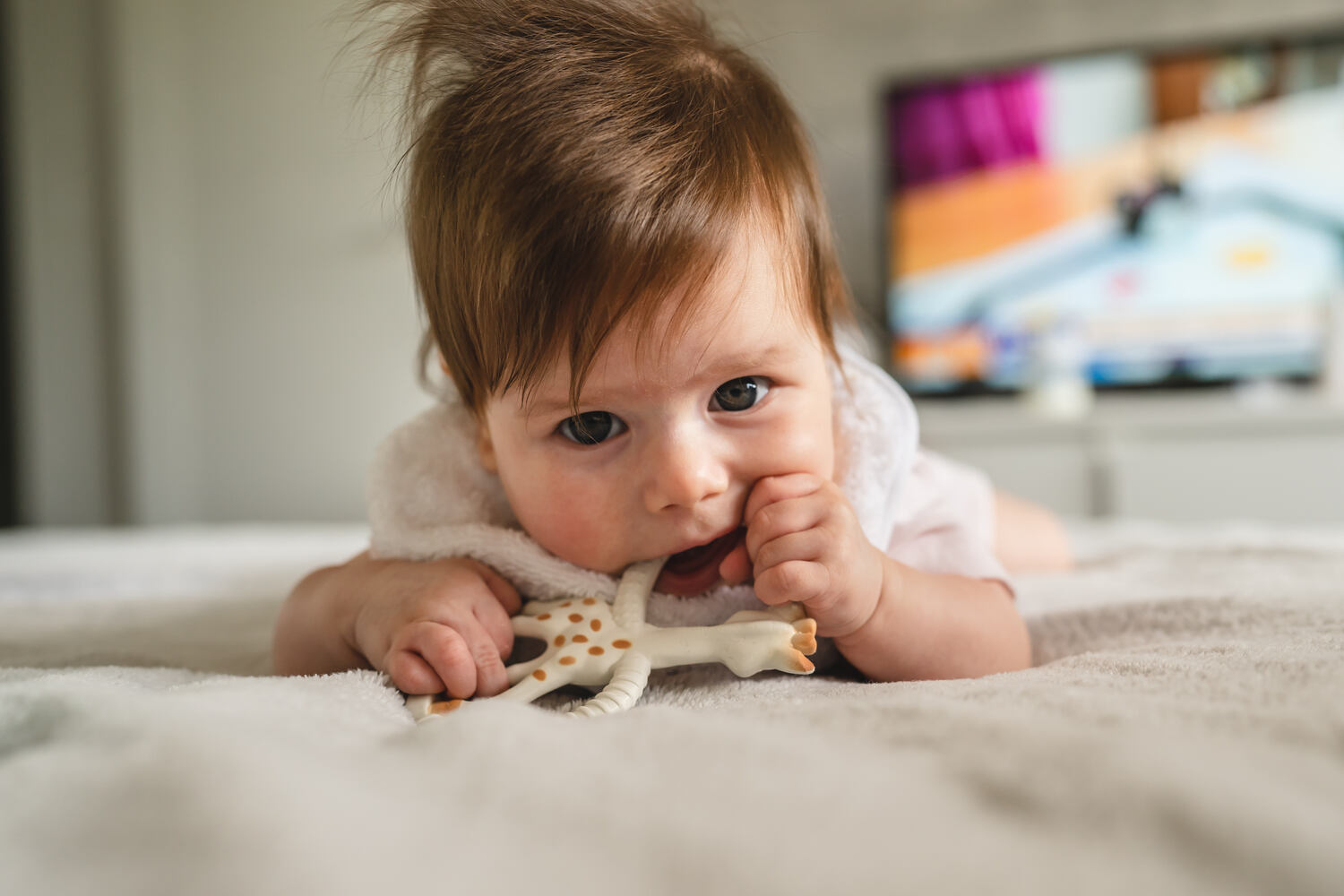
Several dental problems in babies negatively impact their oral health. Some common problems include:
1. Baby Bottle Tooth Decay
Also known as nursing bottle caries, or early childhood caries, happens when your baby’s teeth are in frequent contact with sugars such as milk, formula, or fruit juice. Breastfed infants or babies falling asleep with milk bottles are more likely to develop baby bottle tooth decay. According to several studies, the prevalence of baby bottle tooth decay is as high as 70% [6].
2. Pediatric Gingivitis With Cyst
Gingivitis in babies, also known as pediatric gingivitis, is common among babies and is characterized by sore and inflamed gums, especially during teething. This is considered to be a precursor for gum disease and can be extremely painful and uncomfortable. This may eventually lead to the formation of a dentigerous cyst known as an eruption cyst [7].
3. Excessive Thumb Sucking
Babies can resort to thumb sucking since it helps soothe their sore and inflamed gums, and aids in reducing anxiety. However, prolonged thumb sucking beyond the age of 3 years is a cause of concern.
4. Teeth Grinding
Teeth grinding (bruxism) is an involuntary act of clenching the teeth that is common in babies and toddlers. This occurs due to some discomfort in the jaws when primary teeth erupt. This may stop once the teeth erupt and develop fully. However, some babies may not outgrow this condition and require dental attention [8].
5. Baby Teeth Loss
Losing baby teeth is a natural stage of development in children. But babies losing a tooth early due to severe tooth decay, trauma, or gingivitis can be a cause of concern.
Tips to Keep Your Baby’s Teeth Healthy
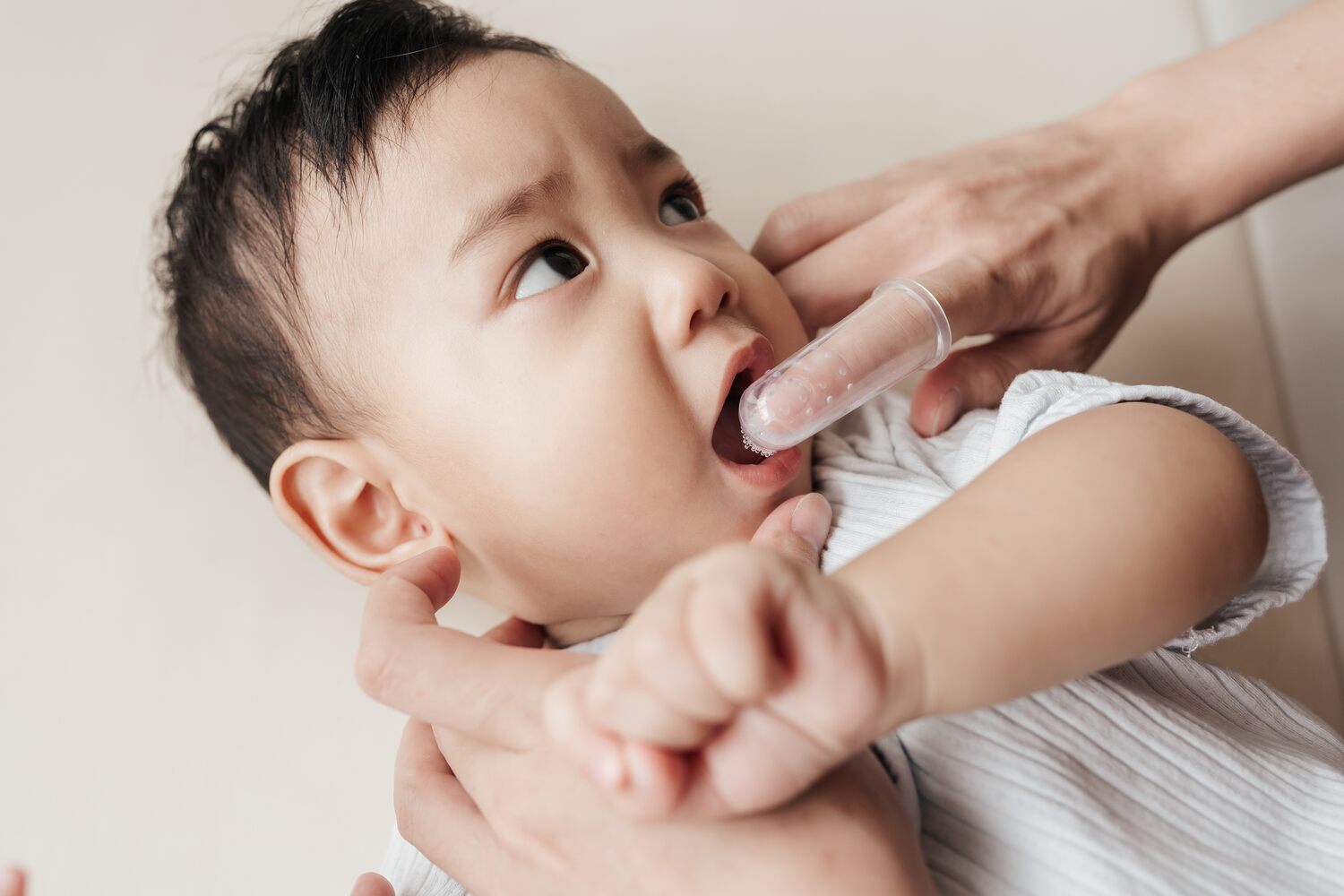
As a parent, it is essential to care for your baby’s teeth as early as possible or even before the first tooth erupts. Here is a comprehensive list of tips to keep your baby’s teeth healthy:
Things To Do
- Clean your baby’s gums with a moist cloth after every feed
- Once the first tooth erupts, brush them with a soft toothbrush
- Use a low-dose fluoride toothpaste (initially a rice grain size and you can gradually use a pea-size amount)
- Hydrate the baby well since it increases the salivary flow. Saliva helps flush out bacteria, food debris, and plaque from the mouth
- Give your baby a healthy, and well-balanced diet with all the essential nutrients needed for healthy gums and teeth. These include fresh fruits and vegetables, grains, and nuts (consult your baby’s pediatrician before you begin solids) [9].
- Transition your baby to a sippy cup as early as possible
- Take your baby to a dentist once in six months for oral checkups
Things To Avoid
- Do not breastfeed the baby to sleep [10]
- Do not give your baby a milk bottle at night
- Do not give your baby excess sugary foods and drinks [11]
- Do not ignore sore gums and tooth discoloration in babies, and consult the dentist immediately for further action.
When to Consult a Doctor?
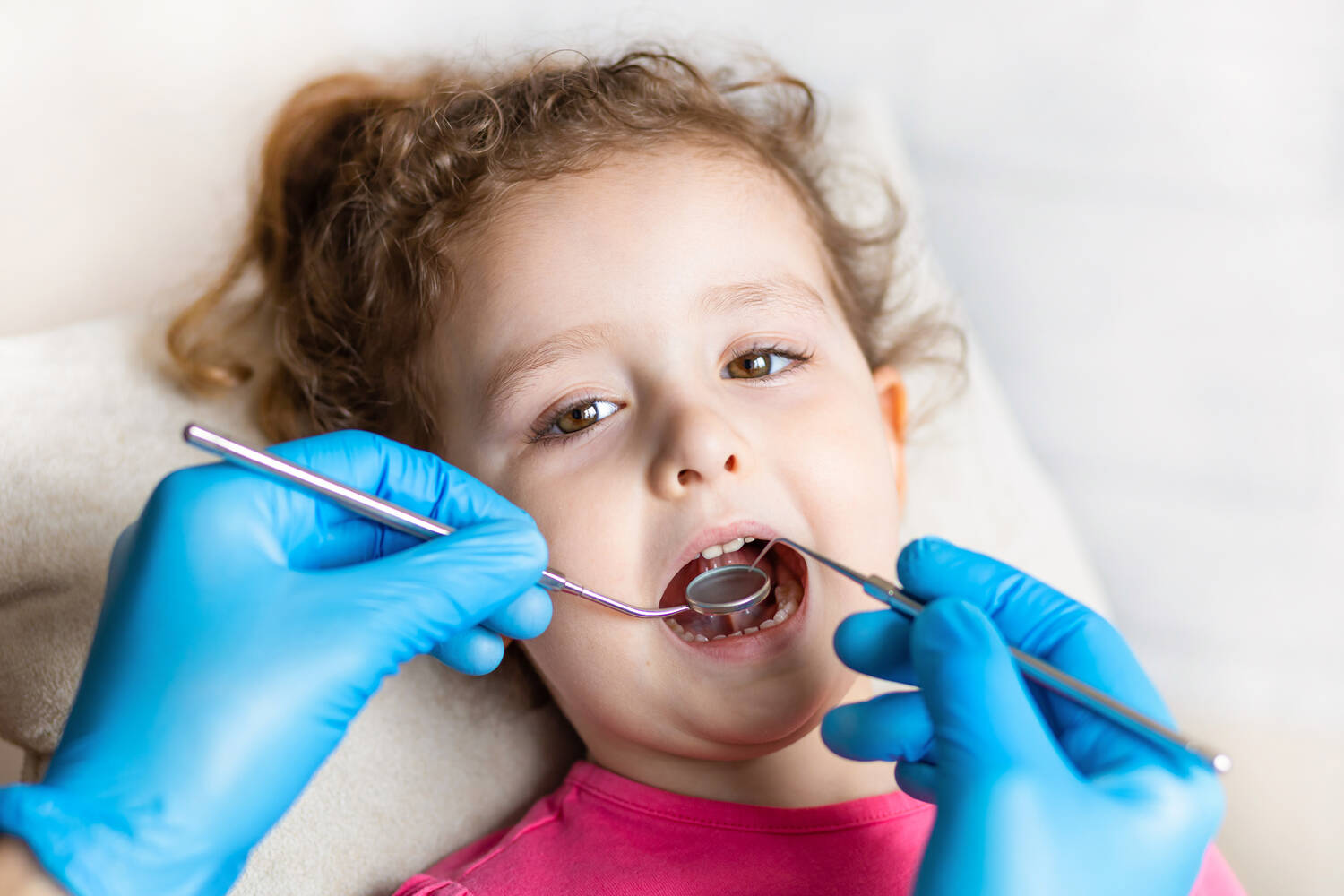
It is important to note that you must consult a doctor as soon as your baby’s first tooth erupts, i.e. around 6 months of age [12]. This helps remove any kind of dental phobia or anxiety in babies and makes them familiar with the dentist. This also ensures the dentist will be able to detect any dental problem at an early stage to offer appropriate treatment.
Baby teeth form a strong foundation for the permanent teeth to erupt. Healthy primary or baby teeth give way to healthy permanent dentition. Taking care of baby teeth with proper tips to follow and avoid, and inculcating good oral hygiene habits can go a long way in establishing a healthy lifestyle that may continue even in adulthood. Do not ignore your baby’s dental health and do visit your baby’s dentist once in 6 months for an oral examination.
FAQs
1. What Causes Bad Baby Teeth?
Bacteria in the mouth can feed on excess sugar in the baby’s mouth to form harmful acids and toxins. These erode the outer enamel surface and cause tooth decay. Untreated tooth decay results in the development of cavities in the teeth.
2. Is Milk Bad For Teeth At Night?
Milk is considered to be a good source of calcium for baby teeth. However, too much milk at night can do more harm than good, especially if given to the baby in a bottle at night. The sugar from the milk can pool around baby teeth and combine with the bacteria to form harmful toxins and acids. This can eventually erode the enamel layer and cause tooth decay and prominent cavities if not treated on time.
3. What Foods To Avoid For Healthy Baby Teeth?
You must avoid sticky foods like candy, lollipops, and pastries, starchy foods like bread, crackers, and pasta, flavored drinks like sodas and juices, citrus fruits like lemons, and oranges and dried fruits
References
- Knowledge and Awareness of Primary Teeth and Their Importance among Parents in Bengaluru City, India – [https://www.ncbi.nlm.nih.gov/pmc/articles/PMC4890064/]
- Teething in children and the alleviation of symptoms – [https://pubmed.ncbi.nlm.nih.gov/12415773/]
- Infant oral health: Knowledge, attitude, and practices of parents in Udaipur, India -[https://www.ncbi.nlm.nih.gov/pmc/articles/PMC3858743/]
- Do Baby Teeth Really Matter? Changing Parental Perception and Increasing Dental Care Utilization for Young Children – [https://www.ncbi.nlm.nih.gov/pmc/articles/PMC5514377/]
- Promoting parenting strategies to improve tooth brushing in children: design of a non-randomized, cluster-controlled trial – [https://www.ncbi.nlm.nih.gov/pmc/articles/PMC6731582/]
- Primary Oral Health Care in India: Vision or Dream? – [https://www.ncbi.nlm.nih.gov/pmc/articles/PMC5086011/]
- Gingival Diseases in Childhood – A Review – [https://www.ncbi.nlm.nih.gov/pmc/articles/PMC4253289/]
- Sleep Bruxism in Children: Etiology, Diagnosis, and Treatment—A Literature Review – [https://www.ncbi.nlm.nih.gov/pmc/articles/PMC8471284/]
- Nutrition, Oral Health, and the Young Child – [https://www.ncbi.nlm.nih.gov/pmc/articles/PMC6860753/]
- Early childhood caries: parents’ knowledge, attitude and practice towards its prevention in refugee camps in Erbil, Iraq – [https://www.ncbi.nlm.nih.gov/pmc/articles/PMC10599036/ ]
- Baby Food and Oral Health: Knowledge of the Existing Interaction – [https://www.ncbi.nlm.nih.gov/pmc/articles/PMC9140504/]
- First Dental Visit: Age Reasons Oral Health Status and Dental Treatment Needs among Children Aged 1 Month to 14 Years – [https://www.ncbi.nlm.nih.gov/pmc/articles/PMC9983582/]

